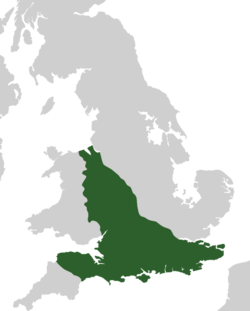Wessex
Kingdom of the West Saxons Westseaxna rīce (Old English) | |||||||||
|---|---|---|---|---|---|---|---|---|---|
| 519–927 | |||||||||
|
Flag of Wessex | |||||||||
 The Kingdom of Wessex in 900 AD | |||||||||
| Capital and largest city | Winchester | ||||||||
| Official languages | Old English | ||||||||
| Common languages | Old English (official), Latin | ||||||||
| Religion |
| ||||||||
| Government | Absolute Monarchy | ||||||||
| King | |||||||||
• 519–534 (first) | Cerdic | ||||||||
• 924–927 (last) | Athelstan | ||||||||
| Legislature | Witenagemot | ||||||||
| Historical era | Heptarchy | ||||||||
• Established | 519 | ||||||||
• Disestablished | 927 | ||||||||
| Currency | Penny | ||||||||
| |||||||||

Wessex was an old Anglo-Saxon kingdom before England became one country. It was one of seven kingdoms in England. It was named after the West Saxons. It was in the south and southwest of England. Wessex was a kingdom from the 6th century until the English state was made in the 9th century. It was an earldom between 1016 and 1066. Then "Wessex" was not an official place name. The 19th century novelist Thomas Hardy wrote about Wessex in his books which tell stories set in that area.
His Royal Highness The Prince Edward was given the title "Earl of Wessex" when he married Sophie who became the Countess of Wessex. The title Earl of Wessex had not been used since the last earl, King Harold Godwinson, was killed at the Battle of Hastings in 1066.

